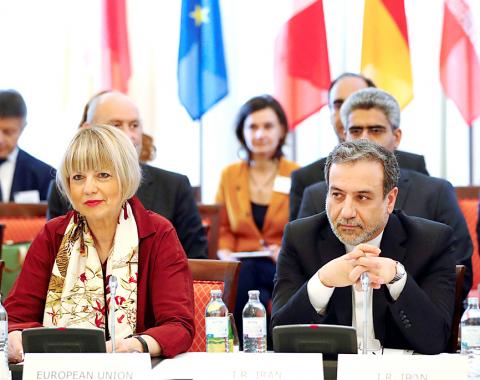Parties to Iran’s 2015 nuclear deal yesterday met in Vienna for emergency talks called in response to an escalation in tensions between Iran and the West that included confrontations at sea and Tehran’s breaches of the accord.
Britain, France, Germany, Russia, China and Iran have been trying to salvage the pact since the US withdrew from it in May last year and reimposed and toughened sanctions on Iran, crippling an already weak economy.
The European-led efforts to protect trade with Iran against the US sanctions have yielded nothing concrete so far.

Photo: Reuters
Earlier this month, Tehran followed through on its threat to increase its nuclear activities in breach of the agreement.
“All our steps taken so far are reversible if other parties to the deal fulfil their commitments,” an Iranian diplomat said before the extraordinary meeting of the Joint Commission of the Joint Comprehensive Plan of Action was due to start.
In response to the sanctions, Iran said in May it would decrease its commitments under the nuclear pact. Under the deal, most international sanctions against Tehran were lifted in return for limitations on its nuclear work.
So far, Iran has breached the limit of its enriched uranium stockpile as well as enriching uranium beyond a 3.67 percent purity limit set by its deal with major powers, defying a warning by Europeans to stick to the deal.
The UN Atomic Energy Commission, which has been policing the deal, has confirmed the measures announced by Tehran.
“[Trade vehicle] INSTEX, along with other measures, will be discussed in the meeting. Other parties should accelerate their efforts, otherwise Iran will take a third step,” the diplomat said.
The meeting in Vienna comes after Iran’s Revolutionary Guards seized a British-flagged oil tanker on July 19, two weeks after British forces captured an Iranian oil tanker that it said was violating sanctions on Syria.
Iran’s senior nuclear negotiator Abbas Araqchi yesterday said that Britain’s seizure of the Iranian tanker was a violation of the nuclear pact.
Britain has called for a naval mission to ensure safe shipping through the Strait of Hormuz, but an Iranian government spokesman yesterday said such a mission would send a “hostile message.”
Britain yesterday said that Royal Navy destroyer HMS Duncan had arrived in the Persian Gulf to join a British frigate escorting British-flagged ships through the Strait.
Meanwhile, Iranian Atomic Energy Organization President Ali Akbar Salehi yesterday told lawmakers in Tehran that Iran would restart activities at the Arak heavy water nuclear reactor, the Iranian Student News Agency reported.

The CIA has a message for Chinese government officials worried about their place in Chinese President Xi Jinping’s (習近平) government: Come work with us. The agency released two Mandarin-language videos on social media on Thursday inviting disgruntled officials to contact the CIA. The recruitment videos posted on YouTube and X racked up more than 5 million views combined in their first day. The outreach comes as CIA Director John Ratcliffe has vowed to boost the agency’s use of intelligence from human sources and its focus on China, which has recently targeted US officials with its own espionage operations. The videos are “aimed at

STEADFAST FRIEND: The bills encourage increased Taiwan-US engagement and address China’s distortion of UN Resolution 2758 to isolate Taiwan internationally The Presidential Office yesterday thanked the US House of Representatives for unanimously passing two Taiwan-related bills highlighting its solid support for Taiwan’s democracy and global participation, and for deepening bilateral relations. One of the bills, the Taiwan Assurance Implementation Act, requires the US Department of State to periodically review its guidelines for engagement with Taiwan, and report to the US Congress on the guidelines and plans to lift self-imposed limitations on US-Taiwan engagement. The other bill is the Taiwan International Solidarity Act, which clarifies that UN Resolution 2758 does not address the issue of the representation of Taiwan or its people in

SHIFT: Taiwan’s better-than-expected first-quarter GDP and signs of weakness in the US have driven global capital back to emerging markets, the central bank head said The central bank yesterday blamed market speculation for the steep rise in the local currency, and urged exporters and financial institutions to stay calm and stop panic sell-offs to avoid hurting their own profitability. The nation’s top monetary policymaker said that it would step in, if necessary, to maintain order and stability in the foreign exchange market. The remarks came as the NT dollar yesterday closed up NT$0.919 to NT$30.145 against the US dollar in Taipei trading, after rising as high as NT$29.59 in intraday trading. The local currency has surged 5.85 percent against the greenback over the past two sessions, central

US Indo-Pacific Commander Admiral Samuel Paparo on Friday expressed concern over the rate at which China is diversifying its military exercises, the Financial Times (FT) reported on Saturday. “The rates of change on the depth and breadth of their exercises is the one non-linear effect that I’ve seen in the last year that wakes me up at night or keeps me up at night,” Paparo was quoted by FT as saying while attending the annual Sedona Forum at the McCain Institute in Arizona. Paparo also expressed concern over the speed with which China was expanding its military. While the US